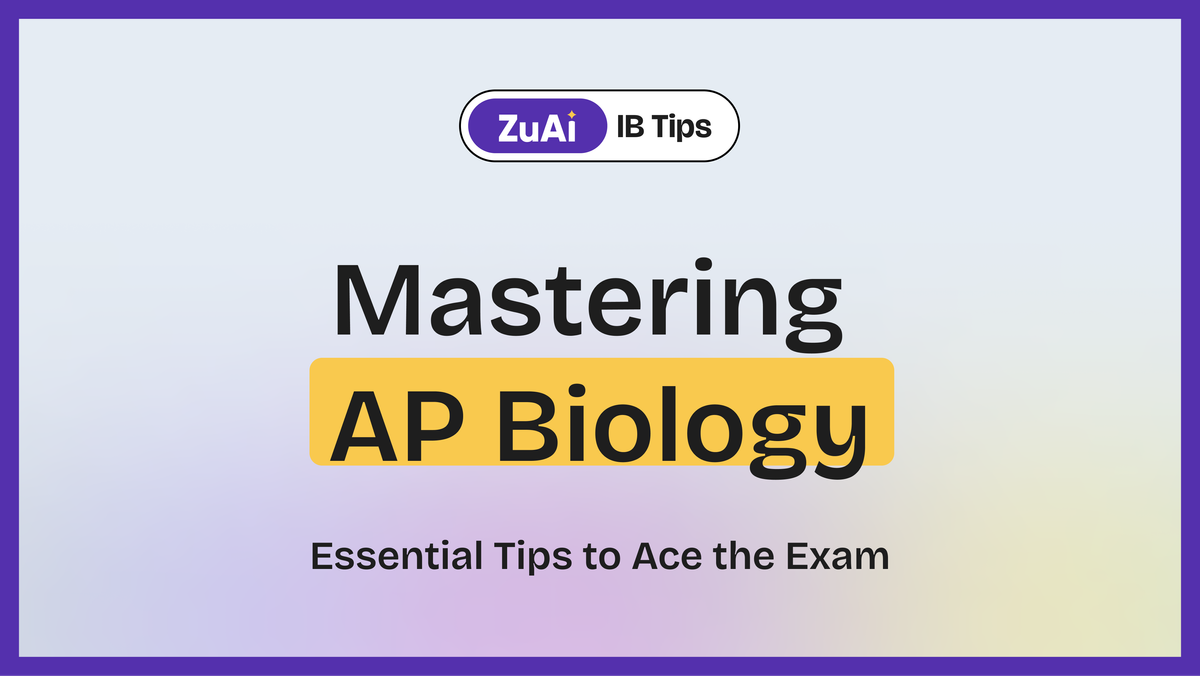Mastering AP Biology: Essential Tips to Ace the Exam

Author: Dr. Amanda Carter, AP Biology Instructor & Exam Expert
AP Biology is one of the most challenging and rewarding Advanced Placement courses, offering students a deep dive into the intricacies of life sciences. Whether you’re tackling cell structure, evolution, or ecological systems, preparing effectively is key to acing the AP Biology exam. In this guide, we’ll break down the best strategies to master the material and earn a top score.
Mastering AP Biology: Essential Tips to Ace the Exam
Why Is AP Biology Challenging?
AP Biology covers a vast range of topics, from molecular biology to ecosystem dynamics. The exam is designed to test not just your knowledge but also your ability to apply concepts and analyze data.
Exam Format Overview:
- Multiple-Choice Questions (MCQs): 60 questions in 90 minutes, accounting for 50% of the exam score.
- Free-Response Questions (FRQs): 6 questions in 90 minutes, including 2 long-response and 4 short-response questions, making up the remaining 50%.
Success requires both memorization and critical thinking skills, making it essential to use strategic preparation methods.
1. Understand the AP Biology Framework
Study the Four Big Ideas
The AP Biology curriculum revolves around four key themes:
- Evolution: Explains the diversity of life.
- Cellular Processes: Focuses on energy and communication.
- Genetics and Information Transfer: Examines heredity and gene expression.
- Interactions: Explores how biological systems interact with one another.
Align your study sessions with these themes to ensure comprehensive preparation.
2. Master the Science Practices
In addition to content knowledge, the AP Biology exam evaluates your ability to apply scientific practices:
- Analyzing and interpreting data
- Developing and using models
- Designing experiments
- Making predictions based on evidence
Pro Tip: Practice graphing and interpreting data from experiments. These skills are frequently tested in both multiple-choice and free-response sections.
3. Use High-Impact Study Strategies
Create a Study Plan
Divide the syllabus into weekly topics and focus on one area at a time. For example:
- Week 1: Cell structure and organelles
- Week 2: Cellular respiration and photosynthesis
- Week 3: Genetics and inheritance patterns
Stick to your schedule to ensure steady progress.
Practice Active Recall
Use flashcards or apps like Quizlet to test yourself on key concepts, such as the steps of mitosis or the Calvin cycle. This method reinforces memory better than passive reading.
Solve Past Papers
The College Board’s AP Central offers practice exams and sample questions. Solving these under timed conditions will help you get familiar with the format and improve time management.
4. Tackle Free-Response Questions with Confidence
Understand the FRQ Scoring Criteria
Free-response questions are graded on specific rubrics. Points are awarded for including correct scientific terminology, data analysis, and logical reasoning.
Tips for FRQs:
- Always label graphs and diagrams accurately.
- Use complete sentences, and clearly explain your reasoning.
- Practice writing concise but thorough answers.
Example: For an FRQ about enzyme activity, explain how temperature and pH affect enzyme function, referencing specific data from an experiment.
5. Leverage Quality Study Resources
Recommended Resources
- Textbooks: Campbell Biology is the gold standard for AP Biology.
- Review Books: Barron’s and Princeton Review offer concise summaries and practice questions tailored to the exam.
- Online Tools:
- Bozeman Science: Engaging video tutorials on key biology concepts.
- ZuAI: Free lessons aligned with the AP curriculum.
6. Avoid Common Pitfalls
Over-Memorizing Without Understanding
AP Biology is less about rote memorization and more about application. Focus on understanding processes, such as how ATP is generated in cellular respiration or how genetic information is passed down.
Skipping Experimental Design
The exam often tests your ability to design experiments. Practice setting up hypotheses, identifying control variables, and predicting outcomes.
Bonus Tip: AI app for IB Exams = ZuAI
It's the ultimate AI app designed to help your child excel in their IB exams. As a parent, you want the best for your child, and so do we.
ZuAI provides personalized study support, practice questions, and detailed explanations tailored specifically to the IB curriculum.
Think of it as a smart tutor who understands your child’s unique learning needs, helping them tackle challenging subjects with confidence.
With ZuAI, you can feel reassured knowing your child is getting the extra help they need to succeed and build a bright future.
We genuinely care about your child's success and are here to support them every step of the way.

Looking for free solutions to previous year's question papers? Check out ZuAI's YouTube channel.
FAQ Section
Q1: How much time should I dedicate to studying AP Biology each week?
Dedicate 6-8 hours per week, focusing on reviewing notes, practicing questions, and completing timed tests.
Q2: What are the most important topics for AP Biology?
Focus on cellular processes (e.g., photosynthesis, cellular respiration), genetics, and ecology, as these are heavily weighted on the exam.
Q3: Can I use a calculator during the AP Biology exam?
Yes, a four-function, scientific, or graphing calculator is allowed. Practice using it beforehand to ensure efficiency during the exam.
Q4: How do I manage time during the exam?
For MCQs, aim to spend no more than 1.5 minutes per question. For FRQs, allocate 20 minutes to long responses and 6-8 minutes to short responses.
Conclusion
AP Biology may be challenging, but with the right strategies, it’s completely manageable. Focus on mastering the core concepts, practicing scientific skills, and using high-quality resources to prepare. By staying consistent and confident, you’ll be well on your way to a top score.
Good luck on your AP Biology journey—your hard work will pay off!
